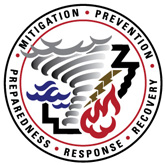College: College of Nursing and Health Professions
Department: Health Sciences and Risk Management
Description
The minor in Homeland Security and Disaster Preparedness is a multidisciplinary program offered in the College of Nursing and Health Professions and the College of Liberal Arts & Communication.
This multidisciplinary minor will integrate principles of early recognition and treatment, mitigation, cultural and spiritual influences, issues related to law enforcement, media and mental health aspects of biological, chemical, radiological and nuclear terrorism, as well as natural disasters.
Students completing the minor should have a basis of knowledge to be a contributor in disasters and emergencies in their communities and places of employment. As a result of these classes, fear and concern should be appropriately decreased or increased(depending on the agent involved), knowledge improved, with students willing to make the hard decisions related to moral/ethical dilemmas.
Please consult with your advisor if you plan on pursuing a minor in homeland security & disaster preparedness.
Curriculum
Curriculum and minor requirements can be found in the most current Undergraduate Bulletin.





